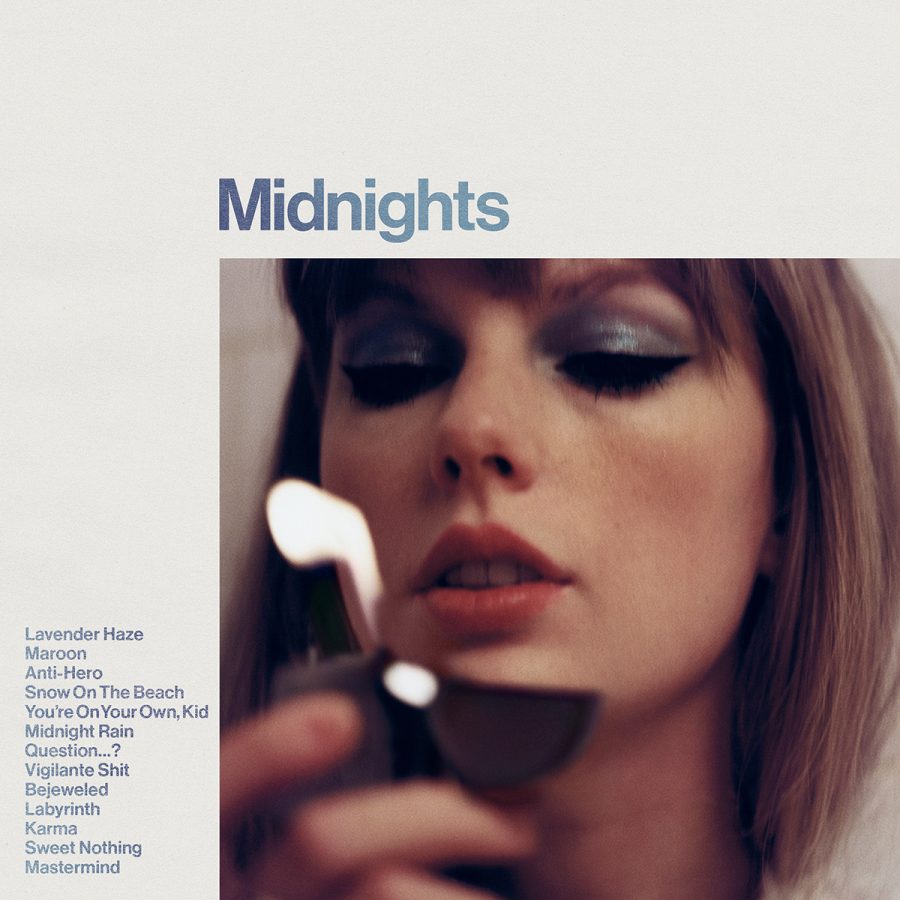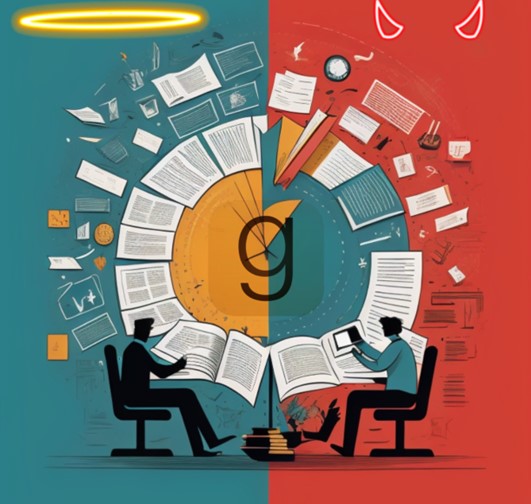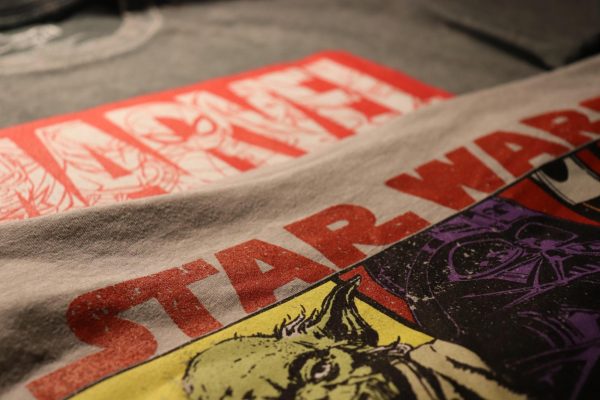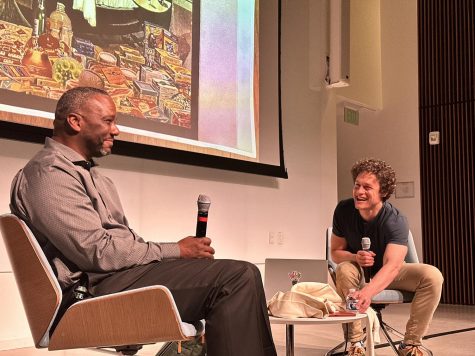Review: Taylor Swift’s “Midnights” Lacks Novelty
“While I consider myself a diehard Taylor Swift fan in every way possible, her new album, “Midnights,” was not what I expected and has less to offer than her previous albums.
As I stayed up until 12:00am on Friday, October 21st, for the release of “Midnights.” I was bubbling with excitement. I was eager for Swift to showcase a new genre like her two previous releases Folklore and Evermore. With recent collaborations with the Haim sisters, fans speculated that her new album would lean towards rock music to accompany her elegant lyrics. When midnight and “Midnights” approached, I, along with many other Swift fans, found myself mistaken.
Shattering all my theories, “Midnights” is pure pop. With a backbone of upbeat pulsing synths, it encourages dancing. The album echoes her previous—and, might I add, revolutionary—albums 1989 and Reputation. Given that Jack Antonoff, Swift’s longtime collaborator, helped write and produce the album, I expected similarities to her previous work. However, “Midnights” feels redundant—dare I say, unoriginal. While, yes, there are some notable high points, they come with some very low lows, consisting of lyrical bluntness and melodic repetition.
“Anti-Hero,” a song inspired by Swift’s insecurities, is simply too cliché. “We all hate things about ourselves,” she says on a promotional Instagram video. The song starts with the line, “I have this thing where I get older, but just never wiser.” It’s funny and fitting, but it feels like a line you’ve heard before, even if you haven’t. The song’s chorus is catchy, but also overly animated and tacky. It sounds tailored for TikTok in its broad relatability: “It’s me, Hi / I’m the problem, it’s me.”
Diving into her struggle with body dysmorphia, Swift sings, “I’ll stare directly at the sun but never in the mirror” as she steps on a scale labeled “fat” in her music video. This is telling rather than showing, removing all the subtlety that makes her lyrics unique. The song is also weirdly upbeat for the subject matter. This is Swift at her most overt, pushy—almost to the point of being anti-Swift.
“Sometimes I feel like everybody is a sexy baby, and I’m a monster on the hill” is the lyric everyone’s talking about. No one seems to know why Swift would ever use the term “sexy baby.” Some fans speculate that it’s a reference to an episode in the sitcom 30 Rock, where a character is told to essentially stop acting childish for the approval of the male gaze. Regardless, it is the epitome of cringe. Here, Swift does not sound like the lyricist who wrote, “Stood on a cliffside screaming give me a reason / your faithless love is the only hoax I believe in,” an iconic line from the ‘Folklore’ song “Hoax.” That Taylor does not seem to have been very involved in the making of this album.
Nor, for that matter, was Lana Del Rey. When it was first announced that Swift would be collaborating with the lyrical powerhouse, fans were overjoyed. But when listening to the song, “Snow On The Beach,” it is hard to even hear Rey on the track. The synth and instrumentation are whimsical, but Rey is merely featured in the background vocals. The song is a missed opportunity when it could have been a pop cultural event discussed for years to come.
The album’s high points are the songs “Maroon,” “Midnight Rain,” and “Mastermind.” These songs follow romantic narratives and feature broadly Swiftian lyrics, though nothing overly memorable or innovative. Filled with 1980s-inspired percussion and alt-rock soundscapes, these songs allude to all her previous pop work, especially Reputation. “Mastermind” is an enigma, as it tells the story of a calculated romance, the exact opposite of what Swift sings about in her song “Invisible String” on ‘Folklore.’ While “Maroon” is my favorite on the album, it sounds painfully similar to her songs “Dress” and “The Archer,” and features a very similar melody to her song “King of My Heart.” While the similarities haven’t stopped me from listening to these songs, they do feel inessential to her overflowing catalog of pop songs.
“You’re on Your Own Kid,” however, is an exception. The song tells a story of young love with a conclusion about independence. “I touch my phone as if it’s your face,” Swift sings as she comments on internet-dependent modern romance. Her chorus, “I search the parties for better bodies / Just to learn that you never cared,” features a clever double entendre, referring both to competition in the music industry and, once again, body dysmorphia. Antonoff’s expertise comes through in the simple reverbed chords that build up into larger synth triumph. This song is where Swift really shines, with a beautiful yet quiet lyrical painting. Thank God.
“Sweet Nothing” is also a notably heartfelt song, especially given that it was co-written with her boyfriend Joe Alwyn under the pseudonym William Bowery. The achingly beautiful ballad references where the couple spent time while Alwyn filmed his latest TV series: “A pebble that we picked up last July / Down deep inside your pocket / We almost forgot it / Does it ever miss Wicklow sometimes?” The song echoes “Reputation’s” closing track, “New Year’s Day.” Both songs are sincere, quiet love notes in the middle of albums filled with aggressively catchy pop songs—the calm before the storm.
“Bejeweled” and “Karma” are two of the catchiest songs on the album, and they’re fun and airy, but they also lack substance. On “Bejeweled,” Swift once again invokes the idea of “shining” for the benefit of others, as she does on her song “Mirrorball” from Folklore, but “Bejeweled” is sugar-coated. The chorus blasts, “When I walk in the room / I can make the whole place shimmer.” Swift sounds more self-assured here, but at the expense of Swiftian storytelling. And her bridge is simply ditsy: “I miss you / But I miss sparkling.” On “Karma” she sings, “Sweet like honey, karma is a cat / Purring in my lap ‘cause it loves me.” While cats and revenge are two Taylor Swift staples, this is not revolutionary.
When contemplating writing this review, I was unsure if I should even mention her song “Vigilante Shit,” but, as long as I am: “Vigilante Shit” is a mess. The song sounds like every revenge song Swift has ever made, but worse. “Draw the cat eye sharp enough to kill a man”: the line is at the border between cleverness and extreme cringe. “I don’t dress for women / I don’t dress for men / Lately, I’ve been dressing for revenge”: something about it feels hopelessly millennial. This is the first Taylor Swift song I did not fully listen to before skipping—a heartbreaking action for all parties involved.
Overall, listening to “Midnights” was not my proudest moment as a Taylor Swift fan. It’s fun, but nothing about it feels like a step forward for her storytelling or her musicianship. Still, following a Grammy-winning album, iconic rereleased albums and short film, all in the past two years, would be an impossible feat for anyone, even those of us who have sold over 115 million records. Swift is having fun with her music and taking herself less seriously, as she should. “Midnights” proves the hu- manity in Swift. Even undeniable geniuses have bad days. Lacks Novelty
While I consider myself a diehard Taylor Swift fan in every way possible, her new album, “Midnights,” was not what I expected and has less to offer than her previous albums.
As I stayed up until 12:00am on Friday, October 21st, for the release of “Midnights.” I was bubbling with excitement. I was eager for Swift to showcase a new genre like her two previous releases Folklore and Evermore. With recent collaborations with the Haim sisters, fans speculated that her new album would lean towards rock music to accompany her elegant lyrics. When midnight and “Midnights” approached, I, along with many other Swift fans, found myself mistaken.
Shattering all my theories, “Midnights” is pure pop. With a backbone of upbeat pulsing synths, it encourages dancing. The album echoes her previous—and, might I add, revolutionary—albums 1989 and Reputation. Given that Jack Antonoff, Swift’s longtime collaborator, helped write and produce the album, I expected similarities to her previous work. However, “Midnights” feels redundant—dare I say, unoriginal. While, yes, there are some notable high points, they come with some very low lows, consisting of lyrical bluntness and melodic repetition.
“Anti-Hero,” a song inspired by Swift’s insecurities, is simply too cliché. “We all hate things about ourselves,” she says on a promotional Instagram video. The song starts with the line, “I have this thing where I get older, but just never wiser.” It’s funny and fitting, but it feels like a line you’ve heard before, even if you haven’t. The song’s chorus is catchy, but also overly animated and tacky. It sounds tailored for TikTok in its broad relatability: “It’s me, Hi / I’m the problem, it’s me.”
Diving into her struggle with body dysmorphia, Swift sings, “I’ll stare directly at the sun but never in the mirror” as she steps on a scale labeled “fat” in her music video. This is telling rather than showing, removing all the subtlety that makes her lyrics unique. The song is also weirdly upbeat for the subject matter. This is Swift at her most overt, pushy—almost to the point of being anti-Swift.
“Sometimes I feel like everybody is a sexy baby, and I’m a monster on the hill” is the lyric everyone’s talking about. No one seems to know why Swift would ever use the term “sexy baby.” Some fans speculate that it’s a reference to an episode in the sitcom 30 Rock, where a character is told to essentially stop acting childish for the approval of the male gaze. Regardless, it is the epitome of cringe. Here, Swift does not sound like the lyricist who wrote, “Stood on a cliffside screaming give me a reason / your faithless love is the only hoax I believe in,” an iconic line from the ‘Folklore’ song “Hoax.” That Taylor does not seem to have been very involved in the making of this album.
Nor, for that matter, was Lana Del Rey. When it was first announced that Swift would be collaborating with the lyrical powerhouse, fans were overjoyed. But when listening to the song, “Snow On The Beach,” it is hard to even hear Rey on the track. The synth and instrumentation are whimsical, but Rey is merely featured in the background vocals. The song is a missed opportunity when it could have been a pop cultural event discussed for years to come.
The album’s high points are the songs “Maroon,” “Midnight Rain,” and “Mastermind.” These songs follow romantic narratives and feature broadly Swiftian lyrics, though nothing overly memorable or innovative. Filled with 1980s-inspired percussion and alt-rock soundscapes, these songs allude to all her previous pop work, especially Reputation. “Mastermind” is an enigma, as it tells the story of a calculated romance, the exact opposite of what Swift sings about in her song “Invisible String” on ‘Folklore.’ While “Maroon” is my favorite on the album, it sounds painfully similar to her songs “Dress” and “The Archer,” and features a very similar melody to her song “King of My Heart.” While the similarities haven’t stopped me from listening to these songs, they do feel inessential to her overflowing catalog of pop songs.
“You’re on Your Own Kid,” however, is an exception. The song tells a story of young love with a conclusion about independence. “I touch my phone as if it’s your face,” Swift sings as she comments on internet-dependent modern romance. Her chorus, “I search the parties for better bodies / Just to learn that you never cared,” features a clever double entendre, referring both to competition in the music industry and, once again, body dysmorphia. Antonoff’s expertise comes through in the simple reverbed chords that build up into larger synth triumph. This song is where Swift really shines, with a beautiful yet quiet lyrical painting. Thank God.
“Sweet Nothing” is also a notably heartfelt song, especially given that it was co-written with her boyfriend Joe Alwyn under the pseudonym William Bowery. The achingly beautiful ballad references where the couple spent time while Alwyn filmed his latest TV series: “A pebble that we picked up last July / Down deep inside your pocket / We almost forgot it / Does it ever miss Wicklow sometimes?” The song echoes “Reputation’s” closing track, “New Year’s Day.” Both songs are sincere, quiet love notes in the middle of albums filled with aggressively catchy pop songs—the calm before the storm.
“Bejeweled” and “Karma” are two of the catchiest songs on the album, and they’re fun and airy, but they also lack substance. On “Bejeweled,” Swift once again invokes the idea of “shining” for the benefit of others, as she does on her song “Mirrorball” from Folklore, but “Bejeweled” is sugar-coated. The chorus blasts, “When I walk in the room / I can make the whole place shimmer.” Swift sounds more self-assured here, but at the expense of Swiftian storytelling. And her bridge is simply ditsy: “I miss you / But I miss sparkling.” On “Karma” she sings, “Sweet like honey, karma is a cat / Purring in my lap ‘cause it loves me.” While cats and revenge are two Taylor Swift staples, this is not revolutionary.
When contemplating writing this review, I was unsure if I should even mention her song “Vigilante Shit,” but, as long as I am: “Vigilante Shit” is a mess. The song sounds like every revenge song Swift has ever made, but worse. “Draw the cat eye sharp enough to kill a man”: the line is at the border between cleverness and extreme cringe. “I don’t dress for women / I don’t dress for men / Lately, I’ve been dressing for revenge”: something about it feels hopelessly millennial. This is the first Taylor Swift song I did not fully listen to before skipping—a heartbreaking action for all parties involved.
Overall, listening to “Midnights” was not my proudest moment as a Taylor Swift fan. It’s fun, but nothing about it feels like a step forward for her storytelling or her musicianship. Still, following a Grammy-winning album, iconic rereleased albums and short film, all in the past two years, would be an impossible feat for anyone, even those of us who have sold over 115 million records. Swift is having fun with her music and taking herself less seriously, as she should. “Midnights” proves the humanity in Swift. Even undeniable geniuses have bad days.











